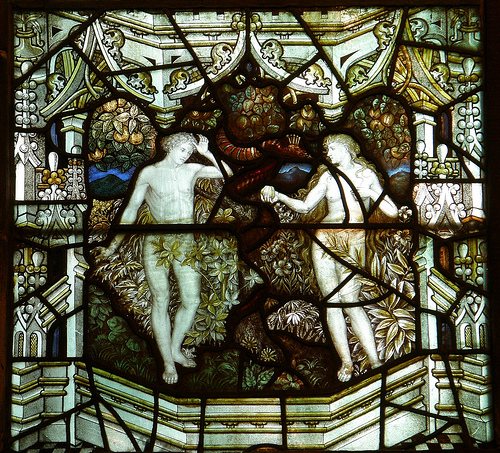We run our website the way we wished the whole internet worked: we provide high quality original content with no ads. We are funded solely by your direct support. Please consider supporting this project.
Judgment and Idolatry
Why was the forbidden tree in the center of the garden called The Tree of the Knowledge of Good and Evil? Since the Bible depicts eating from this tree as the reason humans are estranged from God and the cause of all that’s wrong with humanity, eating from this tree is obviously a terrible thing. But what’s so terrible about acquiring “knowledge of good and evil?” Why wouldn’t God want Adam and Eve to possess this knowledge?
The Hebrew concept of “knowledge” used here goes much deeper than mere intellectual knowledge. Rather, the concept of “the knowledge of good and evil” connotes an attempt by humans to define and experience good and evil on their own—apart from God. Eating from this tree represents a rebellion against God, for we are aspiring to be “wise like God” in the sense of grasping for moral autonomy—an exercise of sovereignty that is appropriate to God alone.
This is exactly what the serpent tempted Eve with. “[W]hen you eat of it,” he said, “your eyes will be opened, and you will be like God, knowing good and evil” (Gen 3:5). Eating from the forbidden tree represents our rebellious attempts to position ourselves as judges rather than leaving all judgment to God, as the bible consistently commands (e.g. Rom 14:10; James 4:11-12).
By eating from the forbidden tree, Eve was guilty of idolatry. Accepting the serpent’s false and untrustworthy depiction of God, Eve stopped trusting God to be her source of life and instead turned to the forbidden tree as a new source of life. This is idolatry.
Such idolatry causes us to define and experience as “good” all that gives us a sense of life. Conversely, everything that threatens our idolatrous sources of life is instinctively defined and experienced as “evil.” In other words, our idolatrous hunger unconsciously creates its own version of the Tree of the Knowledge of Good and Evil. We habitually see and experience the entire world through a filter of our self-serving judgments of good and evil.
The love that reflects the reign of God ascribes worth to others, at cost to oneself. In direct opposition to this, the judgment that reflects rebellion against God ascribes worth to oneself, at cost to others, and in rebellion against God’s own determination. Judgment, in other words, is the direct antithesis of agape love.
Put simply: We can’t possibly ascribe unsurpassable worth to others at cost to ourselves, while at the same time detracting worth from others to ascribe worth to ourselves.
Judgment is the antithesis of the kind of love that God always intended humans to receive and express to one another. It’s the antithesis of the kind of love that expresses God’s life and therefore the life of the kingdom.
I’m convinced this is why the Bible teaches that the Tree of the Knowledge of Good and Evil was placed in the center of the garden with the Tree of Life. Life as God intends it revolves around trusting God for his provision while obediently honoring God’s prohibition. This means we are to trust God’s provision of life while honoring God’s prohibition against judgment. And we cannot trust God’s provision of life while we participate in judgment.
The forbidden tree wasn’t some arbitrary test God put in the garden to tempt Adam and Eve. We should rather think of it as a sort of “No Trespassing” sign God lovingly gave to his first children. God was, in effect, teaching them—and us as well—that for life to be lived the way he intended it, for our life to manifest the beautiful kingdom of God, we must never think we can define and experience good and evil apart from him. When we try to do this, we are no longer trusting him for life and we immediately lose our capacity to receive his life and thus love like he loves.
The moment we become judgers, we stop being lovers. The moment we eat from the forbidden tree, we’re blocked from access to the Tree of Life (Gen 3:22-24).
Category: General
Tags: Adam and Eve, Idolatry, Judgment, Love, Tree of the Knowledge of Good and Evil
Topics: Following Jesus
Related Reading

The Politics of Jesus
Many are so conditioned by the mindset of the world that they can’t even envision an alternative way of affecting society and politics other than by playing the political game as it is done by the established governmental system. Some thus conclude that, since Jesus didn’t try to overhaul the political systems of his day…

The Call to Suffer
Paul tells us that in all our relations, we are to “have the same attitude of mind Christ Jesus had” (Phil 2:5). Though he was “in very nature God,” he didn’t cling to this status. Rather, for our sake he set aside his divine prerogatives, took on the nature of a servant and “humbled himself…

What Is an Idol?
We all believe lies about God that have caused us to mistrust him and therefore to look elsewhere for life. This is what an idol is. It’s anything we try to use to fill what only God can fill. God never intended anyone or anything other than Jesus Christ to meet our core need for…

Sermon Clip: Escaping the Twilight Zone God
In this sermon clip from Woodland Hills Church, Greg Boyd discusses how in an episode of the Twilight Zone, a young boy gained omnipotent powers, and people were forced to accept his every decision as good—or else. In the full sermon, Greg shows how many people view God this way, and he opens up another…

Love OR Judgment – You Can’t Have Both
Image by Morgan Sessions We cannot judge others because it is not our place as humans to function as the center—because God is that center—and judge other people. In addition, we cannot judge others because we ourselves are sinners who deserve judgment. If we don’t want to be judged, Jesus says, we must not judge. The…

What the hell are we doing here?
Meet Collin Simula. He lives in Columbus, Ohio, and is a part of Central Vineyard church. He is a 30-year-old graphic designer, and a happily married father of three. Collin has spent his whole life in the Church, in every denomination imaginable, from Calvinist/Christian Reformed churches, to a Baptist high school, being a part of…

